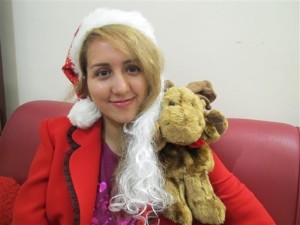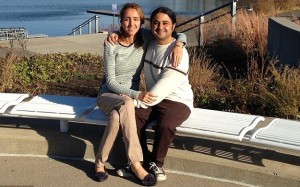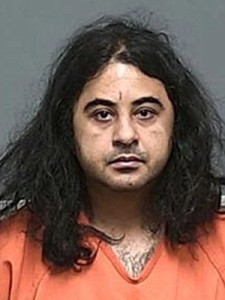January 10-2014

A 27-year-old Iranian woman who arrived in the United States only a few months ago has died after a brutal beating that police in Michigan attribute to her new Iranian-American husband.
Sanaz Nezami was living in one of the more remote parts of the United States—the Upper Peninsula of Michigan. She had been there less than a month when she was hospitalized December 9 with severe brain damage. She was declared brain dead three days later.
The staff at Marquette General Hospital knew nothing about her when she was brought to them. An Internet search located her resume and enabled the hospital to contact her family in Tehran. A hookup with a laptop camera allowed the family to see Sanaz on her last days.

After her death, the family authorized the hospital to transplant her organs, bringing life to seven others around the country, including a 12-year-old girl—people the Nezami family would like to be in contact with.
A Christian minister looked up Islamic burial prayers, which he read over the coffin as Sanaz was buried under the deep snows that have enveloped the region this winter.
In August, Sanaz left Iran for Turkey to marry Nima Nassiri, whom she had met over the Internet. Then they flew to Los Angeles, where Nassiri was born and reared. In November, they drove across the country to Dollar Bay, Michigan, where they rented an apartment and planned to enter Michigan Technical University, where both had been accepted.

. . . booking photo
Now Sanaz is dead and Nassiri, 34, is sitting in a jail cell awaiting trial on charges of second-degree murder. The second-degree charge indicates the sheriff does not believe that Nassiri beat his bride with the intent to kill her.
The Sheriff’s Office hasn’t said anything about its investigation. It isn’t known why Nassiri is assumed to have beaten his wife, whether he has confessed, the reason for the beating and whether this was a one-time beating or had been going on for some time.
Sanaz was considered a rare “ideal donor” and five surgical teams from four states converged on Marquette General where they recovered her heart, both lungs, liver, pancreas, kidneys and intestines for donation. Because of her small stature, some of her organs have gone to save the lives of children. It was Sanaz’s heart that was transplanted into a 12-year-old girl, The Mining Journal of Marquette, Michigan reported.
Sanaz had expected to begin work on a doctorate in environmental engineering at Michigan Tech next semester.
But police say she was beaten by her husband December 8. They received a call from a person they have not identified reporting a possible domestic assault at 11:45 p.m. that night. She was taken to a small local hospital that transported her 100 miles to Marquette General early December 9, where extensive testing established that she had suffered massive head trauma that left her with virtually no brain activity.
“When she arrived here, her injuries were so extensive … her brain was so damaged that she no longer had blood flow to her brain,” Gail Brandly, organ donation liaison at Marquette General, told Zach Jay of The Mining Journal. “Unfortunately, that means that she’s brain dead and that’s irreversible.”
The Houghton County Sheriff’s Office contacted the Pakistani embassy in Washington, which represents Iran in the United States, to try to locate Sanaz’s family.
But Brandly didn’t wait. She googled Sanaz Nezami and found her resume, which included a Tehran phone number. The hospital decided to contact Sanaz’s family directly.
“If a person is going to be able to be an organ donor, and is brain dead, you can only maintain them for so long,” Brandly said. “We wanted, one, for the family to be able to see her—because I wouldn’t be able to accept the death of a family member unless I saw it. And, two, we wanted to preserve the ability to donate organs.”
Looking at her resume, Brandly said she saw that Sanaz was “well-educated, she’s into the environment, she’s into helping people. We knew looking at that from the very moment that she would want to be a donor. Her whole life was about helping people.”
Sanaz’s credentials were also impressive. She had bachelor’s and master’s degrees in French translation. She said she spoke Farsi, French and English fluently and has “basic knowledge in Spanish, German, Arabic and a little Swahili.”
She also had a bachelor’s in environmental health engineering, which is what she planned to continue in Michigan Tech’s doctoral program.
“She was so studious, hard-working,” Sanaz’s older sister, Sara, told The Mining Journal by phone from Tehran. “You know when you saw her C.V., you can see that all her life she was studying. Of course, when she came to America, she wanted to be ‘the cream of the crop.’ She wanted to be the best.”
Sara also said Sanaz did a lot of charity work for the mentally challenged, the sick and the homeless. Though she was a Muslim, she also was part of a Christian congregation and believed that most of the differences between Christians and Muslims were superficial.
“She said, ‘God is the same—no difference between the people of the world,’” Sara said. “Maybe Christian people and Muslim people, there are no differences between them. People are the same, God is the same.”
Sara said, “Some people are studying because of themselves, to pocket money. Pocketing money was not important for Sanaz. She wanted to serve people and humanity.”
Brandly had the challenge of explaining to the family Sanaz’s condition.
“Brain death is hard enough to explain to an American face-to- face, let alone in Farsi,” Brandly said.
The nurses didn’t know what to expect. They were strangers trying to tell a family in a different culture and a different country that the woman still breathing was actually dead. Nurse Kim Grutt said the response was “eye-opening.” She said, “The family was willing to trust us to know she wasn’t coming back.”
Brandly said the family kept asking, “Couldn’t there be a miracle? Couldn’t Sanaz recover?” In the end, Brandly said, “We feel like the miracle was her.”
Cherlynn Erickson, one of the nurses watching over Sanaz, had the idea of coordinating a video chat with the family, allowing them to see Sanaz, to witness the care she was receiving and, eventually, to say their goodbyes.
“We had them basically in the room almost the whole time on the video [Yahoo] Messenger,” Brandly said. As the nurses were going about their duties, tending to Sanaz, the family began making requests that Erickson, Grutt and a third nurse, Alycia Davidson, do little things, like stroke Sanaz’s hair, or kiss her forehead. The nurses became an extension of the family, a proxy for blood relatives half a world away.
Grutt said, “They wanted us to do things for Sanaz that they would have done. They said, ‘Let her know we love her; we’re here.’ I felt completely comfortable.”
Brandly said. “Everyone was very compelled to be there for her. We felt that she was this tiny little innocent person that had no one there, so we were just going to be that family.”
Nurse Davidson said, “We would set up the camera by the bedside, and it would be on for three or four hours, and they would pray and cry and talk to her in Farsi and talk to her in English.”
After Sanaz passed away, Marquette General asked one of its resident physicians, a Muslim, to wash and shroud Sanaz’s body according to Islamic custom. Marquette’s Park Cemetery agreed to designate a section for Muslims so that Sanaz could be interred there. A $5,000 payment from the state crime victim fund paid for the burial, with the top of the casket pointing to Mecca and Islamic prayers recited in English.
The Reverend Leon Jarvis, an Episcopal minister and the hospital’s chaplain, read the prayers while about 20 people, mostly nurses and others who came to know Sanaz only in death, watched as the casket was lowered while snow fell December 18. Jarvis said, “I’ve never seen anyone so quickly adopted by so many.”
Sara said she thinks her sister would be happy to have helped so many people with the gift of transplants. “Some people spend money in charity for the other people,” she said. “But Sanaz gave life to those seven other people.”
Sara has one request that her new friends at Marquette General will try to help her with: connecting with those scattered around the US who received Sanaz’s organs.
“I want American people to help me to get in touch with those seven people who are carrying my sister’s body organs,” Sara said. “I want to be in touch with my new brothers and sisters. Because my daddy wants to hear Sanaz’s heartbeat. He wants to talk to those people.”
